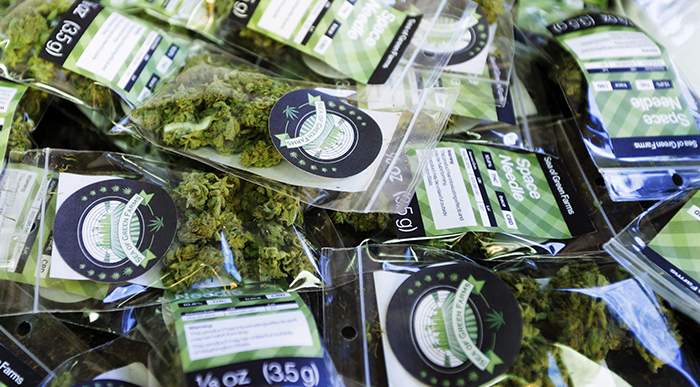With each election cycle, marijuana is legalized in another batch of states. On Tuesday, California, Maine, Massachusetts, and Nevada legalized recreational marijuana, while Arkansas, Florida, and North Dakota approved marijuana for medicinal use. As legal weed becomes commonplace, it is the duty of cannabis advocates to look to the next battles.
In the next decade, the fight will not be about whether or not marijuana will be legalized, but what the weed business will look like. One of the most important issues will be the relationship between workers, management, and the government in the marijuana industry. Considering our newly minted conservative leadership across all three branches of government, union advocacy will have to come from the grassroots. While new states celebrate #legalizingit, let’s look at how unions might work in and for the cannabis industry.
Conversations about unionizing the marijuana industry are nothing new. As early as 2010, Northern California cannabis workers were looking to unionize. Workers at Marjyn, a NorCal marijuana company, joined the Teamsters Local 70 that year. The Teamsters have been longtime leaders in bringing non-union industries into their shop. More recently, the United Food and Commercial Workers International Union has organized marijuana workers in six states and DC under the banner of Cannabis Workers Rising. The UFCW is another larger union, with a roll call of 1.3 million members, but given that its focus is in food retail and processing employees, it is a natural fit to represent the interests of cannabis workers. Not only is the UFCW helping with collective bargaining, but it is also partnering with advocacy groups to sponsor legislation.
In a young industry like cannabis, this might be just as important for workers as collective bargaining. If management is forced into a concession at the beginning of a business’s existence, that is one less concession unions have to fight for at the bargaining table. The UFCW’s Jeff Ferro put it like this: “There is some urgency because if the federal law changes and Big Money and Big Tobacco get into this, we will find ourselves in a race to the bottom again.”
In the early days of the marijuana industry, unions have been instrumental. Many employers have and are still paying workers in cash due to challenges holding funds with national banks. With cash paydays, you lose health insurance, 401K, and even direct deposit options. Long story short, some employers are taking advantage of federal restrictions and passing them on to their employees in the form of stripped benefits. As the restrictions roll off with formal legalization, unions will be necessary to ensure that cannabis workers get the benefits, protections, and guarantees of comparable industries.
As is often the case in the tech industry, some big players in the marijuana industry have called unions a “thing of the past,” citing wages sometimes double minimum wage by the hour. This is a common refrain in new industries, which are known to offer higher than average wages and perks to lure young talent in, but we only need to look at the past to see that this is a false claim. When an industry is newer, there are fewer skilled workers. Workers will gain job training in pursuit of those jobs, driving wages down, and those enticing perks disappear. Sometimes those jobs even go overseas. You only need to look as far as Michael Moore’s brutal, brilliant 1989 documentary Roger and Me to see that corporations will shift their operations to the cheapest competent labor force.
One incredibly heartening aspect of the marijuana industry is that some employers have welcomed unions. In Minnesota, unions and employers worked together to advocate for legalization efforts. In Los Angeles in 2013, UFCW Local 770 helped rally support for an ordinance that cracked down on illegal dispensaries, as in their view, they are essentially scabs. In Oregon, there have been instances illustrating how unions can help consumers. The UFCW is helping cannabis workers create a culture where medical dispensaries feel more like drug stores than convenience stores. This would mean a more informed staff and a more controlled environment. Think of a neighborhood pharmacy as opposed to a Rite-Aid.
As conservative orthodoxy becomes the new normal, you may hear language that tries to pit labor unions against workers and against consumers. This is a false narrative. Workers always benefit from unions. By definition, workers need to bargain together to hope to have a chance against more powerful management forces. But if you look at unionized industries, from auto workers to education, you find that the quality and safety of the product increases with union presence.
Will the marijuana industry be unionized? Yes. It already is thanks to the Teamsters and the UFCW. How powerful those unions will be going forward remains to be seen. You as a consumer will be instrumental in making those decisions. When you buy union, you vote with your wallet. When you vote union, you support your ballot. When you support the union, it benefits everyone.











